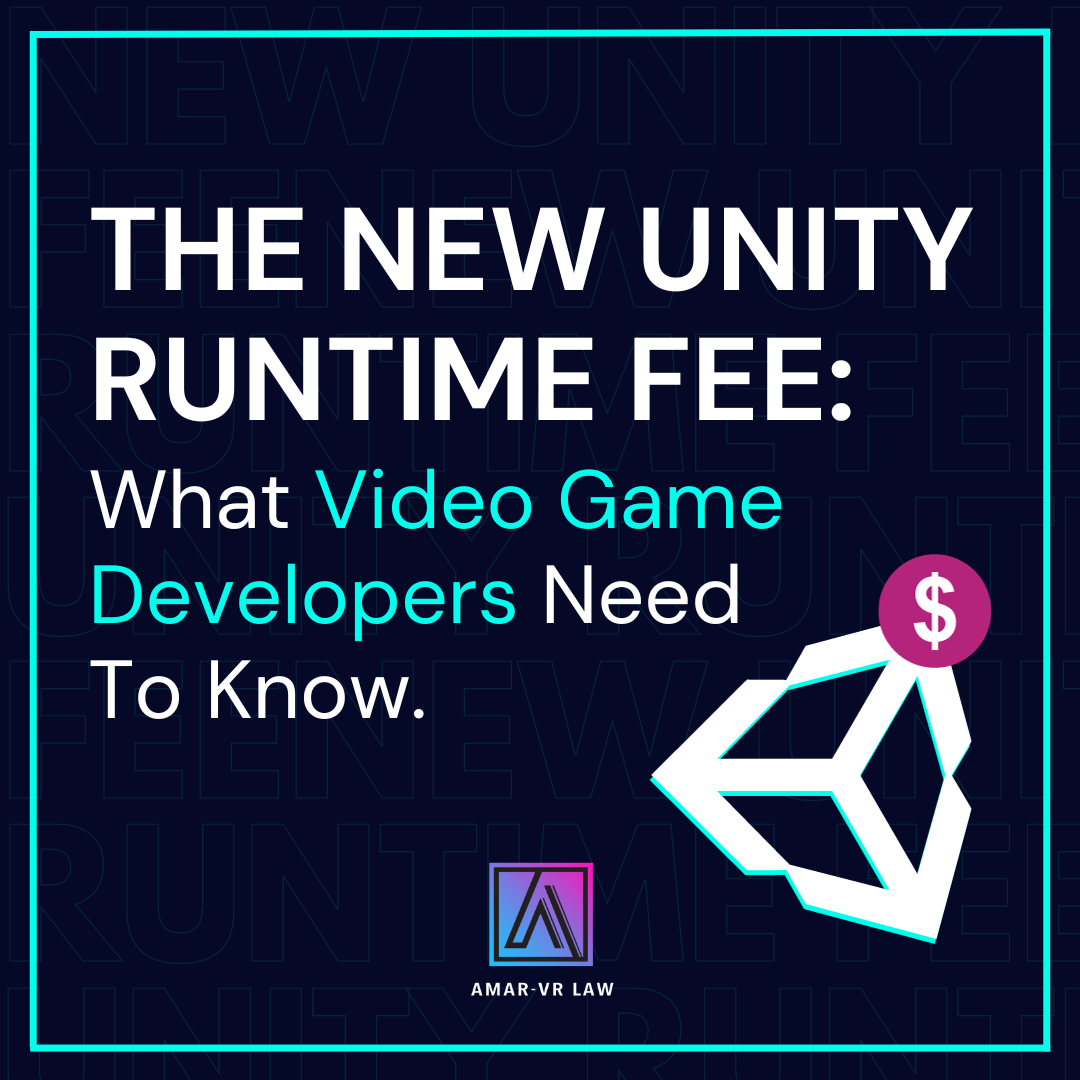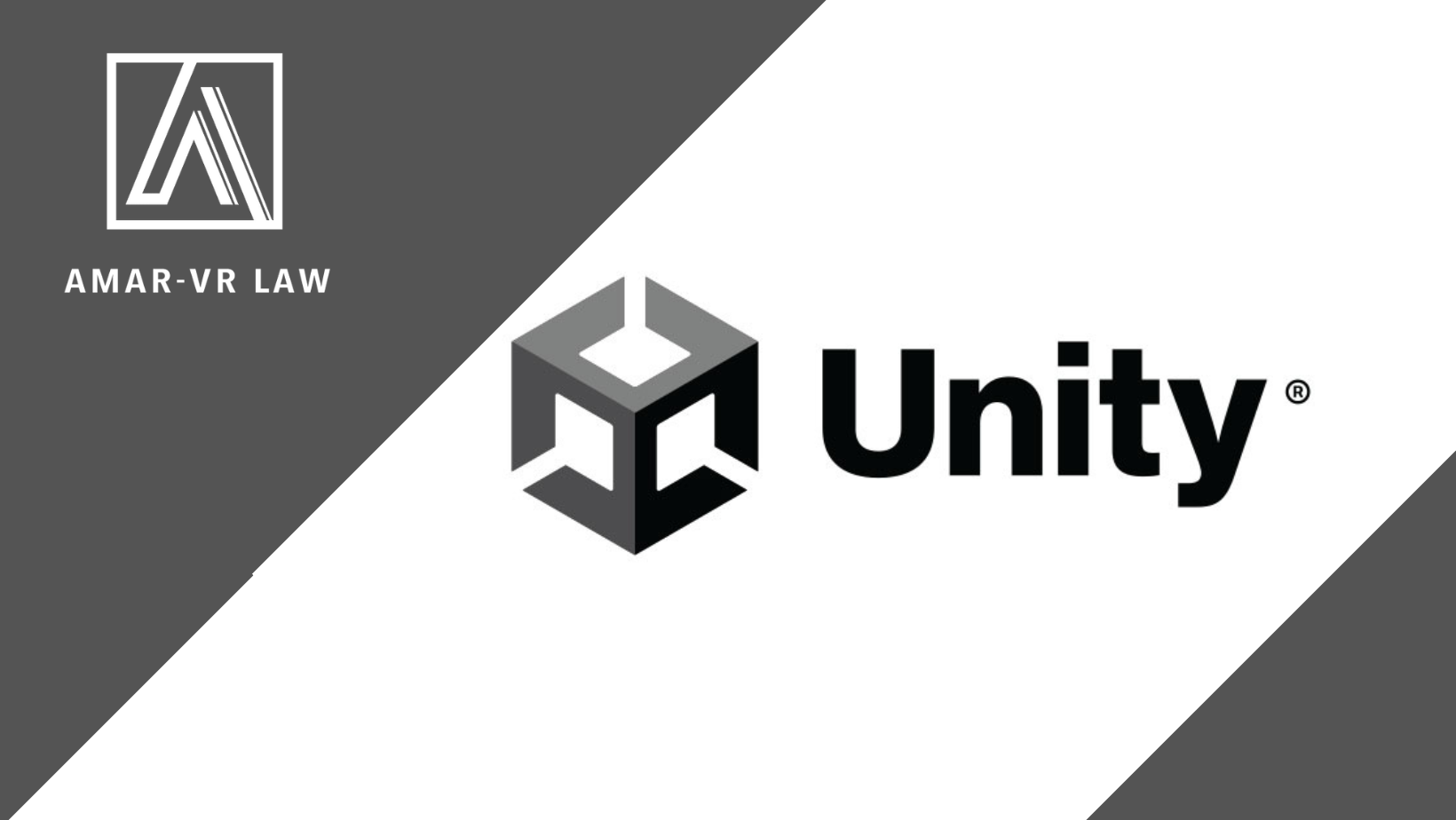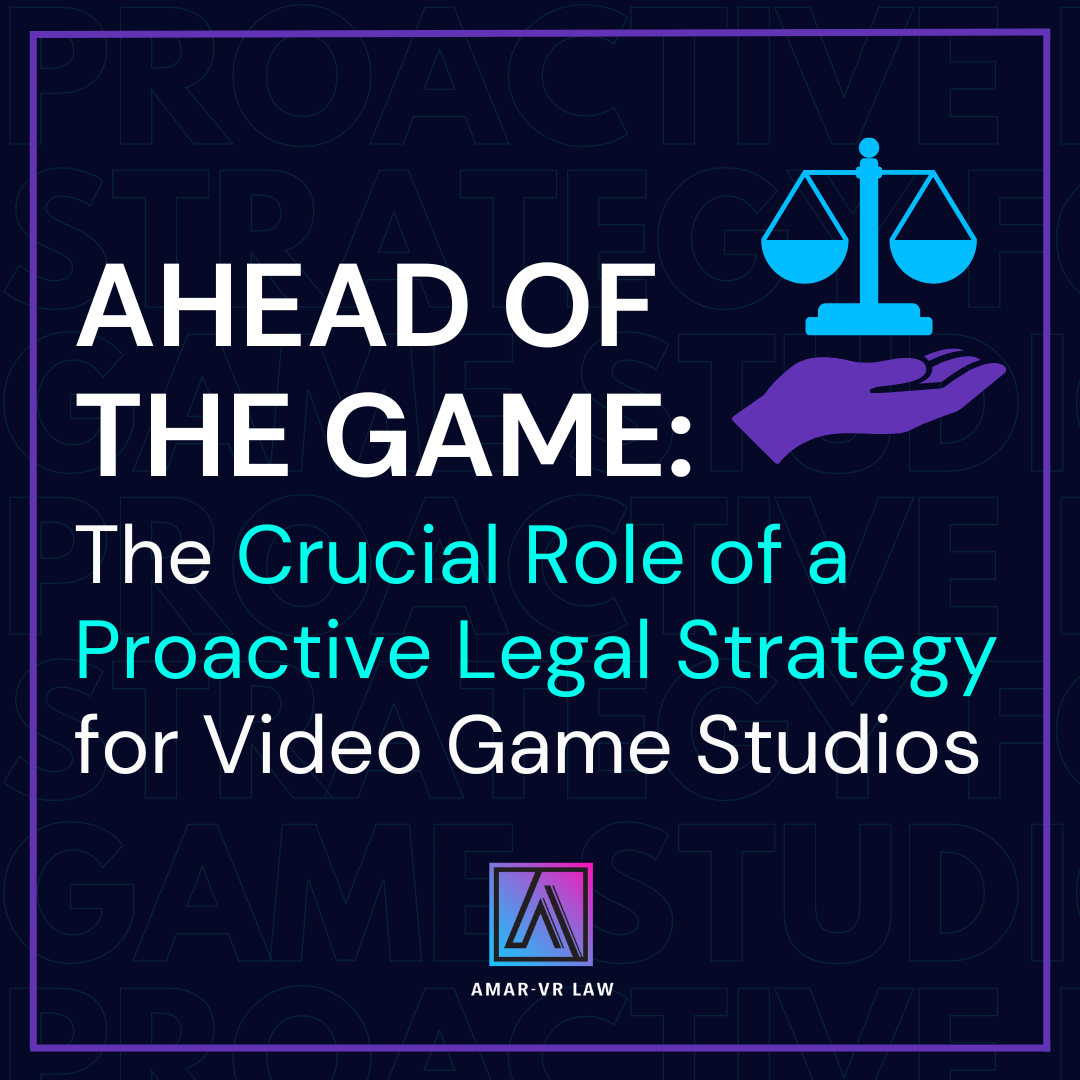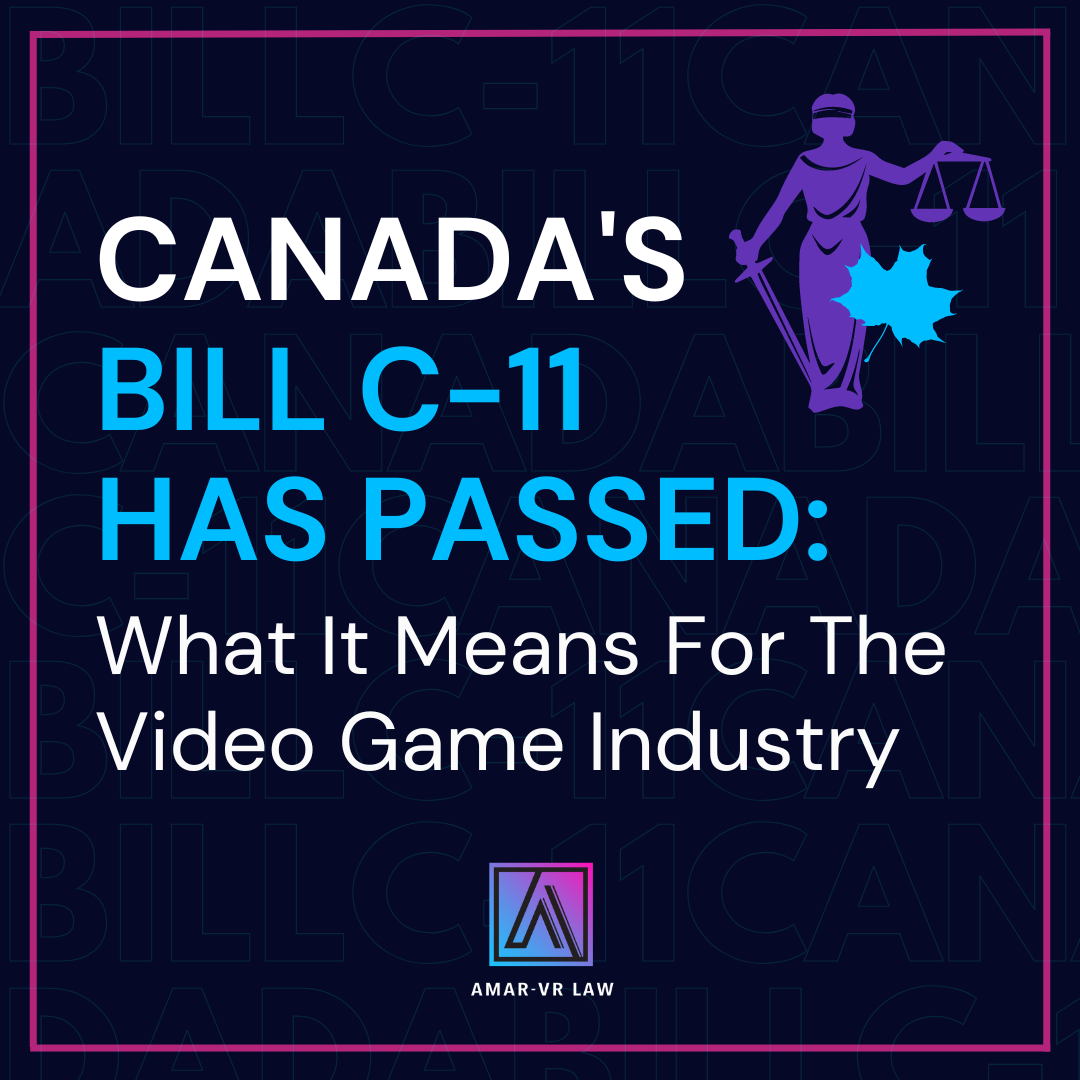
This article is for educational purposes only. Nothing in this article shall constitute legal or other professional advice or an opinion of any kind. Please contact Amar-VR Law, or your own legal counsel, if you have any questions regarding a specific legal issue.
Unity, a widely used game development engine, has recently introduced a significant policy change that's sending ripples through the Video Game industry. The policy includes a new fee for certain games that will be charged on a per-install basis. Developers have reacted with a mix of surprise, concern, and anger. The biggest issue: a lack of clarity surrounding the new fee, and the legal issues that may arise as a result of this unforeseen change.
In this article, we'll dive into the new Unity Runtime Fee, explaining what is currently known about it and exploring the legal implications it carries for Video Game developers and publishers.
Unity's New Runtime Fee Explained
Unity has introduced a new policy that's causing uproar across the gaming landscape. Starting January 1st, 2024, Unity will impose a per-install fee of up to $0.20 on games meeting specific criteria. To incur this fee, a game must have grossed over $200,000 (USD) in revenue in the past 12 months, with a minimum of 200,000 game installs over its lifetime (including only new installs from January 1st, 2024 onward).
This policy means that developers of successful games meeting these criteria will need to share a larger portion of their earnings with Unity. For many, this represents a significant change in how they do business and has led to widespread concern within the development community.
The Response From Developers

Unity's new fee structure has been met with an overwhelmingly negative response from Video Game developers. Many in the community feel that Unity's communication about the policy change has been inadequate at best, and secretive at worst, leading to confusion and uncertainty.
In response to these concerns, some developers are exploring alternative game engines. Epic Games, known for Unreal Engine, offers a different fee structure that may be more attractive to those looking to make a switch. Others are considering open-source engines like Godot, which is free to use.
Developers and others in the industry have made one thing very clear since the announcement of the new Unity Runtime Fee - more information is needed.
Clear communication and transparency around the new fee is essential to regain the trust of Video Game developers, though it may not be enough to keep even the most loyal of Unity customers onboard.
Communication From Unity - A Need For Transparency & Trust
Transparency and trust are critical issues in this policy change. Unity's decision to use its proprietary software for tracking installs raises questions about whether developers can trust the accuracy of these metrics. If disputes arise regarding install numbers, how will they be resolved, and will developers have any recourse if they believe the counts are inaccurate? Video Game developers are, understandably, concerned about paying fees based on data that they don’t have access to.
The risk of "install-bombing", a potential threat similar to "review-bombing", also emerges with this new fee structure. This refers to situations where malicious actors artificially inflate the number of installs to trigger the per-install fee for a game, potentially causing severe financial consequences for the game developer. Unity has assured developers that fees related to fraudulent installs will be removed, but the effectiveness of what is currently nothing more than a promise remains to be seen. Developers want to know that Unity has robust measures in place to prevent abuse of the system, how they work, and what the process for reporting and resolving abuse will look like.
Unsurprisingly, developers are also concerned about future surprise fees and policy changes. The unexpected fee structure change has led to frustration among many developers who had planned their budgets around the previous terms. The announcement of the new Unity Runtime Fee has created uncertainty about what the future holds for developers who choose to remain with Unity. At challenging times like this, the need for industry-specific legal expertise is paramount. Be sure that you have proper legal counsel to help navigate these uncertainties and protect your financial interests as you move forward.
Other Legal Implications for Game Developers & Publishers

Beyond the concerns mentioned above, Unity's new policy has several other legal implications for both game developers and publishers:
Publishing Contracts: Developers with publishing contracts already in progress may need to renegotiate terms to accommodate Unity's new fee structure. This could lead to potential disputes and changes in the business relationship. This is a complex situation with many unknown variables still coming into play. We highly recommend working with a Video Game Lawyer in the case of any renegotiations. In such a delicate position, you don’t want to be taken advantage of by a publisher who is aware that you lack legal counsel.
Engine Preferences: Publishers may develop preferences for specific game engines based on their fee structures. Unity's policy change could influence publishers' decisions about which engines to use for their games, and as such, affect Video Game developers already using Unity.
Impact on Game Types: Free-to-install games that meet the revenue criteria through in-game purchases, or free-to-play games that generate revenue through ads, could become less prevalent if their revenue-per-install is significantly affected by Unity's new fee.
You can find insights into these legal implications in our related blog post,
"Navigating the Legal Landscape: Unity’s New Runtime Fee Rocks the Game Development World".
Risk Mitigation Strategies For Video Game Developers
Given the legal implications of the new Unity Runtime Fee, it's important for game developers to adopt risk mitigation strategies proactively. Here are some key considerations you can make as a Video Game developer:
Legal Counsel: Seek legal counsel to review existing contracts, whether they are in progress or under negotiation. A Video Game Lawyer can help navigate the legal intricacies of Unity's new policy, and ensure you end up with an agreement that is fair but flexible.
Diversification: Consider using a different game engine if Unity's new policy doesn't align with your business model. Explore alternative engines and their fee structures to see if a better option exists for your studio. Be sure to have your legal representative review the fee structure of your alternative choice to find any red flags or potential future problems.
Transparency: Advocate for greater transparency from Unity regarding the tracking of installs and revenue. Clear and open communication can help build trust among Video Game developers who currently feel blindsided by Unity.
Unity's Response

Unity has faced significant backlash from the Video Game development community due to its new fee structure. Developers have voiced their concerns on official and unofficial forums, demanding more clarity and transparency.
Unity's response to these concerns is critical. If the company can address developers' worries and provide workable solutions, it may be able to restore some of the lost trust and confidence. However, the ultimate impact of Unity's pricing change will likely depend on how flexible and responsive the company is to the needs and feedback of its developer community.
On September 17th, 2023, the company publicly
responded to the turmoil on X, formerly known as Twitter, stating that they “have heard” the development community, and they are taking action as a result. They apologized for the confusion and upset, stating that they are making changes to the new policy in the wake of the mass upset caused by last week’s announcement.
Unity has also addressed some of the main concerns raised by Video game developers in their
official forum. Though the company has answered some frequently asked questions, many feel that much more insight is needed to fully understand the implications of this new policy.
Our advice? Keep a very close eye on this developing situation as it continues to unfold. With so much distrust and confusion already, it’s imperative to stay up to date as Unity announces any potential changes to this far-reaching policy.
Conclusion
The new Unity Runtime Fee has sent a shockwave through the Video Game development industry. Developers and publishers are grappling with the legal implications, uncertainties, and risks it presents. As the situation continues to evolve, it's important to understand, and prepare for, the potential legal challenges of building your Video Game with Unity.
This article begins to shed light on these concerns, but it remains crucial for developers to stay informed, seek legal guidance, and adapt to the changing realities of the industry. If your Video Game is built with Unity, don’t risk legal complications or wait to see how things unfold.
Contact
Amar-VR Law
to discuss your specific situation and how we can support your needs.





Address:
100 King Street West,
Suite 5700
Toronto, ON
M5X 1C7
Email: hello@amarvrlaw.com
Phone: 289-919-5929
Business Hours:
Monday: 10:00 AM – 6:00 PM
Tuesday to Friday: 9:00 AM – 5:00 PM
Saturday 9:00 AM – 12:00 PM
Address:
100 King Street West,
Suite 5700
Toronto, ON
M5X 1C7
Email: hello@amarvrlaw.com
Phone: 289-919-5929
Business Hours:
Monday: 10:00 AM – 6:00 PM
Tuesday to Friday: 9:00 AM – 5:00 PM








